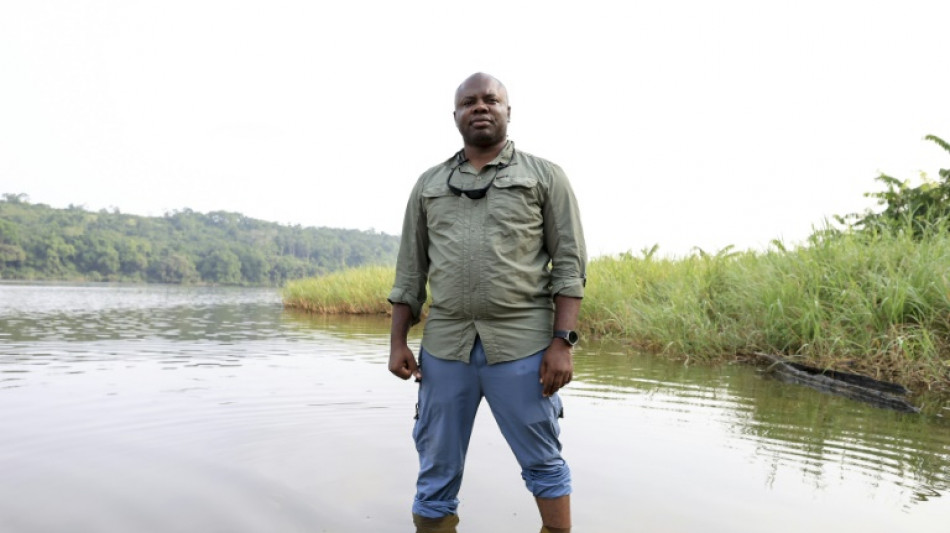
-
 China consumption slump deepens as February prices drop
China consumption slump deepens as February prices drop
-
Phone bans sweep US schools despite skepticism
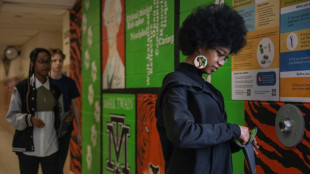
-
 Some 200 detained after Istanbul Women's Day march: organisers
Some 200 detained after Istanbul Women's Day march: organisers
-
'Grieving': US federal workers thrown into uncertain job market

-
 Remains of murdered Indigenous woman found at Canada landfill
Remains of murdered Indigenous woman found at Canada landfill
-
Women will overthrow Iran's Islamic republic: Nobel laureate

-
 Women step into the ring at west African wrestling tournament
Women step into the ring at west African wrestling tournament
-
Trump's tariff rollback brings limited respite as new levies loom

-
 Hackman died of natural causes, a week after wife: medical examiner
Hackman died of natural causes, a week after wife: medical examiner
-
Oops, we tipped it again: Mission over for sideways US lander
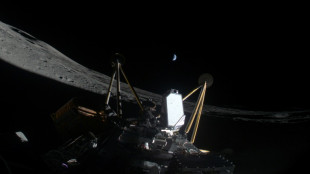
-
 Cyclone Alfred downgraded to tropical low as it nears Australia
Cyclone Alfred downgraded to tropical low as it nears Australia
-
Global stocks mixed as Trump shifts on tariffs weighs on sentiment

-
 Trump says dairy, lumber tariffs on Canada may come soon
Trump says dairy, lumber tariffs on Canada may come soon
-
Trump cuts $400 mn from Columbia University over anti-Semitism claims

-
 US Fed chair flags policy uncertainty but in no rush to adjust rates
US Fed chair flags policy uncertainty but in no rush to adjust rates
-
Adopted orphan brings couple 'paradise' in war-ravaged Gaza

-
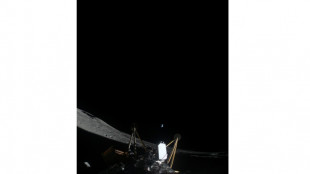 Oops, we tipped it again: Mission over for private US lander
Oops, we tipped it again: Mission over for private US lander
-
Greenland's mining bonanza still a distant promise

-
 Pope 'stable' as marks three weeks in hospital with breathless audio message
Pope 'stable' as marks three weeks in hospital with breathless audio message
-
Shares slump on Trump tariffs tinkering, jobs

-
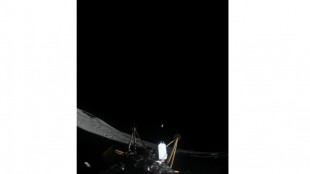 Mission over for private US lander after wonky landing
Mission over for private US lander after wonky landing
-
Thousands stranded as massive WWII bomb blocks Paris train station

-
 UK court cuts longest jail terms on activists, rejects 10 appeals
UK court cuts longest jail terms on activists, rejects 10 appeals
-
US hiring misses expectations in February as jobs market faces pressure

-
 S.Sudan heatwave 'more likely' due to climate change: study
S.Sudan heatwave 'more likely' due to climate change: study
-
US company says Moon mission over after landing sideways again
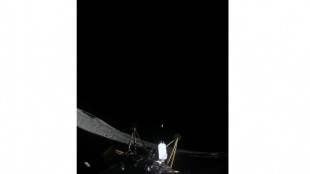
-
 Trump says farmers keen to quit 'terrible' S. Africa welcome in US
Trump says farmers keen to quit 'terrible' S. Africa welcome in US
-
US stock markets rise as investors track Trump tariffs, jobs

-
 US hiring misses expectations in February, jobs market sees pressure
US hiring misses expectations in February, jobs market sees pressure
-
Disco, reggae on King Charles's 'eclectic' Apple playlist

-
 Australian casino firm strikes deal to avoid liquidity crunch
Australian casino firm strikes deal to avoid liquidity crunch
-
Deposed king's grandson makes low-key return to Egypt

-
 Stock markets, bitcoin down as Trump policies roil markets
Stock markets, bitcoin down as Trump policies roil markets
-
Bangladesh student leader aims to finish what uprising began

-
 Japan, Britain stress free trade in Tokyo talks
Japan, Britain stress free trade in Tokyo talks
-
Spain targets men's 'deafening silence' in gender violence battle

-
 Spain under pressure to abort nuclear energy phase-out
Spain under pressure to abort nuclear energy phase-out
-
Hungary femicide sparks outcry on gender violence

-
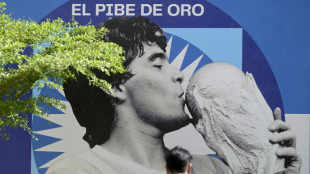 Trial of Maradona's medics to start four years after star's death
Trial of Maradona's medics to start four years after star's death
-
Women spearhead maternal health revolution in Bangladesh

-
 Apple step closer to seeing end of Indonesia iPhone sales ban
Apple step closer to seeing end of Indonesia iPhone sales ban
-
China's exports start year slow as US trade war intensifies

-
 Asian stocks, bitcoin down as trade uncertainty roils markets
Asian stocks, bitcoin down as trade uncertainty roils markets
-
China tariffs aimed at Trump fan base but leave wiggle room

-
 Musk's SpaceX faces new Starship setback
Musk's SpaceX faces new Starship setback
-
Trump signs executive order establishing 'Strategic Bitcoin Reserve'

-
 Australian casino firm scrambles for cash to survive
Australian casino firm scrambles for cash to survive
-
Musk's SpaceX faces setback with new Starship upper stage loss

-
 US and European stocks gyrate on tariffs and growth
US and European stocks gyrate on tariffs and growth
-
Deja vu on the Moon: Private US spaceship again lands awkwardly
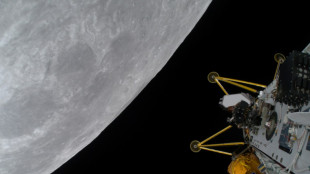

Saving the mysterious African manatee at Cameroon hotspot
Ever since his first hard-won sightings of African manatees, award-winning marine biologist Aristide Takoukam Kamla has been devoted to protecting the little known and atrisk aquatic mammals.
African manatees are found in fresh water along the coast of western Africa, such as in Cameroon's vast Lake Ossa where the researcher first saw them more than 10 years ago.
But they are shy creatures -- spotting them requires setting out before dawn when the lake is glassy and tranquil, all the better for following the trails of bubbles and, maybe just maybe, catching two big nostrils taking a quick breath.
"I was expecting to see them like on YouTube: in clear water, jumping like dolphins... a completely surreal idea" stemming from publications on manatees in Florida, the 39-year-old Cameroonian recalled, smiling.
Their African cousins, however, are very different and the then University of Dschang apprentice researcher had to row for a long time before being rewarded.
Thanks to local fishermen, Takoukam Kamla has now learnt how to spot African manatees more easily within the darkened depths of the 4,500-hectare (11,000-acre) Lake Ossa, part of a sprawling wildlife reserve in southwestern Cameroon.
They are his "favourite animal", the subject of his doctorate at the University of Florida -- and the reason he won this year's prestigious Whitley Award that recognises groundbreaking biodiversity work by grassroots conservationists.
- Endangered habitat, poaching -
American scientist Sarah Farinelli was moved to tears after seeing five African manatees, including a female with her calf, while out on the lake with Takoukam Kamla.
"Its huge! There are certain places in Africa where it's impossible to see them," said Farinelli, who is in her 30s and studies the marine mammals in Nigeria.
Much still eludes researchers about the Trichechus senegalensis -- how many are in Cameroon; how long do they live; when and where do they migrate.
African manatees are found between Mauritania and Angola but "it's a very little studied species, around which many mysteries still remain", Takoukam Kamla said.
Sometimes known as sea cows, the large marine herbivore is listed as "vulnerable" on the red list of the International Union for Conservation of Nature.
But the Cameroonian scientist thinks that is "an under-estimation of the real status of this species, which is subject to poaching" and whose habitat is "constantly in danger".
Takoukam Kamla set up the African Marine Mammal Conservation Organisation which has five laboratories including in the lakeside fishing village of Dizangue.
On Lake Ossa, the animal's sole predators are human -- only a few years ago, manatees were still being served up in the village restaurant.
Manatee hunting is now outlawed and the dish has vanished from menus. A blue statue of a manatee has even been erected in their honour.
But threats remain.
Takoukam Kamla, standing on the shores of the lake, points to a palm oil refinery whose waste is dumped into the water.
Another threat is the positioning of a net across the lake to maximise catches as it could "trap a small manatee in its mesh", he complained, getting into a heated discussion with a fisherman in his dug-out canoe.
"We're indigenous, we live off this and we have never had to suffer prohibitions at home," the old man grumbled bitterly.
"If you want to impose bans on us, you will have to pay us every month."
- Biological combat -
Relations between the scientists and the local communities whose fishing traditions have been passed down the generations are tricky.
But an environmental threat that struck three years ago brought their two worlds together.
Half of the lake's surface became covered by the invasive giant salvinia -- Salvinia molesta -- a free-floating plant that has made the lake uninhabitable for both fish and manatees.
To combat it, scientists used a microscopic insect that feeds exclusively on salvinia and called on the fishermen to help.
"They used to take the salvinia infested with weevils and put a bit everywhere in the lake," AMMCO researcher Thierry Aviti said.
Three years on, the menacing plant has all but disappeared.
"At one point, we couldn't cope anymore" but promises were kept, Dizangue fisherman Thierry Bossambo said, marked by the memories of long nights with no fish.
The bridges built with the fishermen is something Takoukam Kamla is keen to maintain to avoid "parachute science", a term referring to scientists dropping into local communities from their academic ivory towers to undertake field work.
And to counter possible poaching, he wants to develop the area's eco-tourism.
It's a "priority", agreed Gilbert Oum Ndjocka, curator of the nearby Douala-Edea National Park, who said "all stakeholders are allies for conservation".
Ch.Lefebvre--CPN
